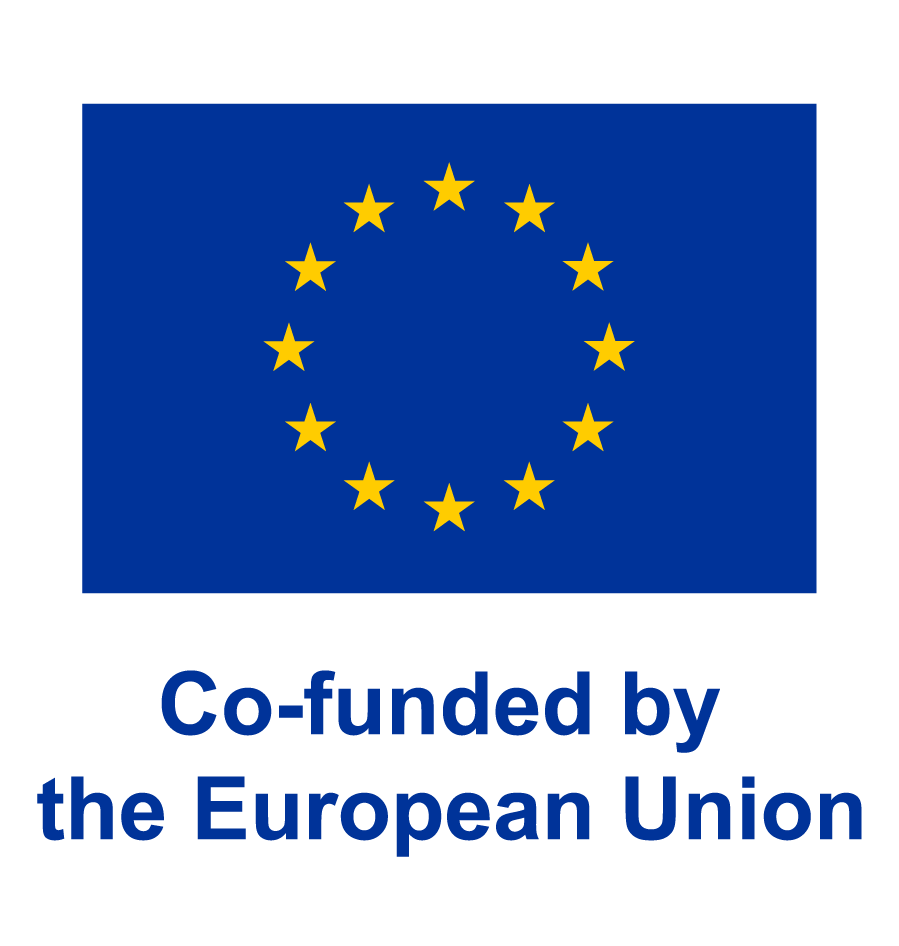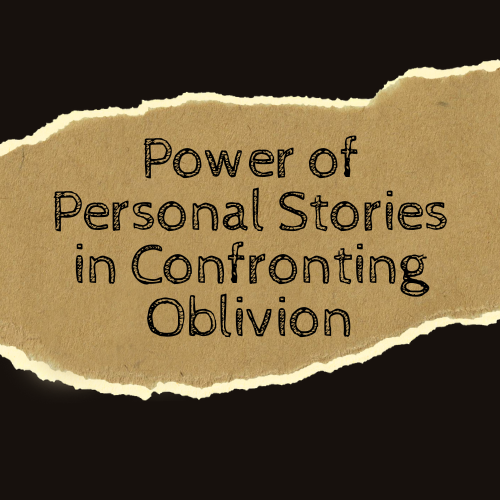Power of Personal Stories in Confronting Oblivion
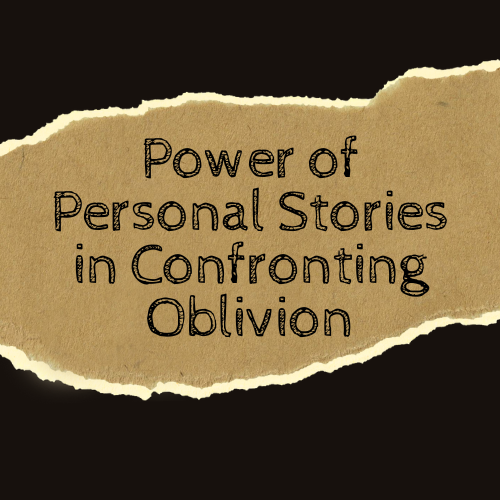
The project „Power of Personal Stories in Confronting Oblivion” aims to strengthen the practices of remembrance of the Holocaust, and other genocides committed during WWII, in the partner countries and the European Union. The year 2025 is particularly important for this topic, as it will be the 80-years anniversary of the end of WWII, liberation of different concentration camps and other locations (such as Auschwitz, Dachau Jasenovac and Stara Gradiška), and the anniversary and liberation of many cities in Europe from Fascist and Nazi occupation.
The project focuses on combating Holocaust and other genocides denial, countering distortion, and trivialization of historical facts, by sharing accurate information, organizing public debates on the best practices of confronting distortion and creating new materials and methods based on personal stories and biographies of time-witnesses, victims, and survivors. The project also analyzes and highlight resistance and/or organized opposition.
The project's activities started on April 2024, when the partners met in Rijeka, Croatia, for the kick-off meeting. The event was held in the Faculty of Humanities and Social Sciences in Rijeka, and organized in cooperation with the Center for Holocaust and genocide research in Southeast Europe. During the meeting, the partners discussed questions connected to finances, administration and communication, and planned in detail the project activities. They also took part to a guided tour, organized with in cooperation with the historian Vanni D'Alessio, on locations connected with Holocaust, resistance, and WWII in the city of Rijeka.
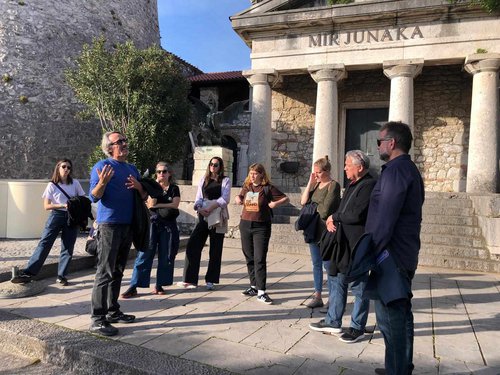
On April 29th, 2024, the partners organized the round-table "Different approaches to interpretations of the history of the Holocaust, genocide and other war crimes from the Second World War", in the Rijeka city library. Speakers in the panel were: Oleg Mandić (publicist, honorary president of UABA Opatija), Josip Naglić (Natural History and Graphics School Rijeka), Lovro Kralj (Center for Holocaust and Genocide Research in Southeast Europe), Timea Serb (Intercultural Institute Timisoara), Boris Hajdinjak (Synagogue Maribor ) and Vesna Teršelič (Documenta,). The conversation was moderated by Vjeran Pavlaković (Faculty of Philosophy in Rijeka). In his closing words, Oleg Mandić, the last children who left Auschwitz concentration camp, emphasized how it is important to not remain silent about suffering. Because of this reason, since 1955, he has been writing and speaking about his experience in the camp. The event was organized in cooperation with the Center for Research on the Holocaust and Genocide in Southeast Europe (Faculty of Philosophy in Rijeka) and the Association of Anti-Fascist Fighters and Anti-Fascists of the Primorje-Gorski Kotar County.
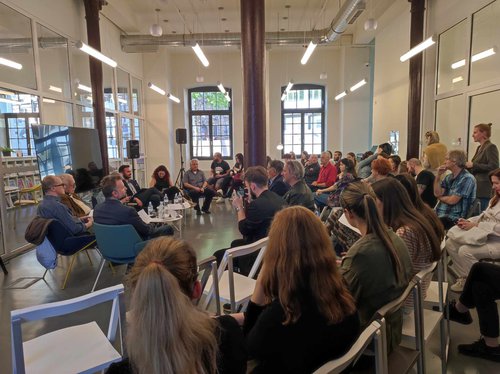
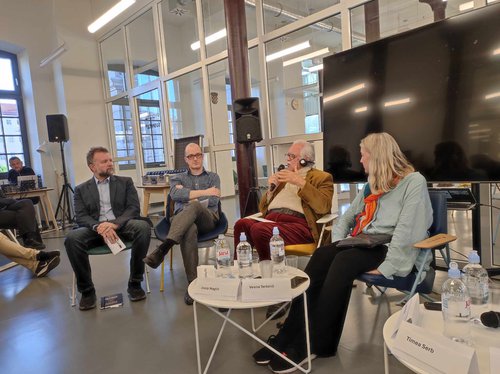
On April 30, 2024, high school and university students from Rijeka visited the Memorial Center "Lipa Remembers", located in Lipa, Croatia, on the 80th anniversary of the massacre in the town. On April 30, 1944, Nazi soldiers killed 269 Lipa residents, including 96 children, to revenge actions of sabotage and cut the support system of partisans and other opponents. Nazi soldiers looted and burned the village. They lead the locals into "Kvartirka's house", closed the exits, poured gasoline on the house and then set it on fire by throwing grenades. Of all the locals who were in the village that day, only six of them survived, as they remained hidden. In memory of those killed, the students planted a laurel and a fig tree. The students also visited the exhibition "After the Last April" by Karel Čargonja and Goran Ferčec, about the contemporary life of Lipa and the people still living in the town.
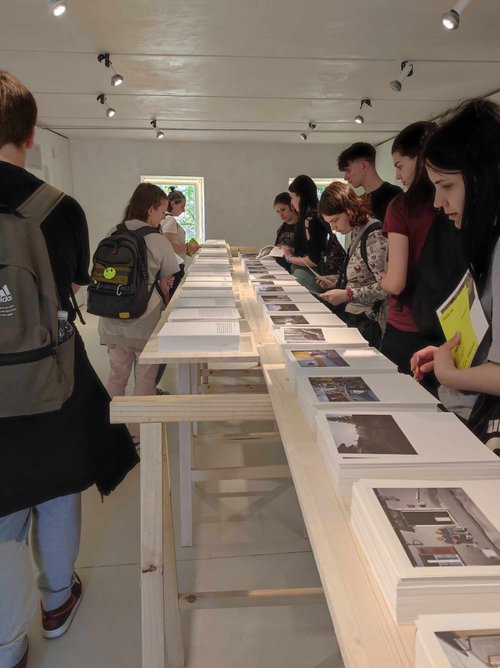
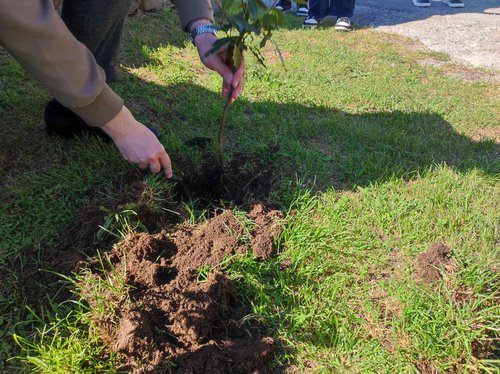
From the 1st to the 4th of September 2024, the partners organized the training for teachers and educators "Power of personal stories in confronting oblivion". The training took place in Dachau, Germany, where the participants were hosted by the partner organization Max Mannheimer Haus. Around 30 teachers and educators from all over Europe took part in the training. After an introduction to the project and its donors, on the first day of the program, the participants got to meet and know each other. The second day started with a guided visit to the Memorial site of the Dachau concentration camp. In the afternoon, the participants discussed in groups the importance of using biographies as a tool in education and Holocaust education, and took part in the workshop "Comic Memories", on the use of comics to teach about personal stories, organized by the Dachau Concentration Camp Memorial Site. On the third day, the participants took part in workshops organized by Documenta and Max Mannheimer Haus, which also focused on the use of biographies and personal stories to approach WWII through different didactic tools, such as the use of archives and textiles. The participants had the occasion of learning more about good practices of the partner organizations, with a focus on Max Mannheimer Haus and Topografia per la storia.
To know more about the training, read the article "Reflecting on personal stories in Holocaust education: my experience at the training “Power or personal stories in confronting oblivion”, written by prof. Abbate, participant of the training: Article - Training Dachau (Emma Abbate).
Back in their countries, the educators organized 1 workshop each, based on the new knowledge, good practices and tools learned in the training.
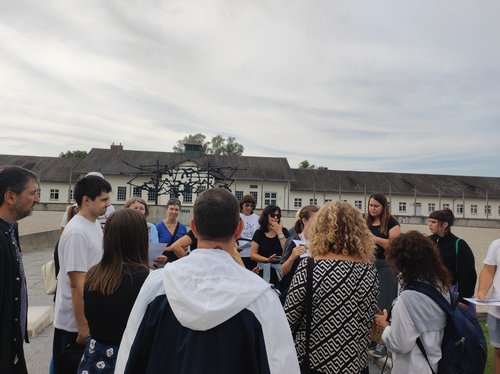
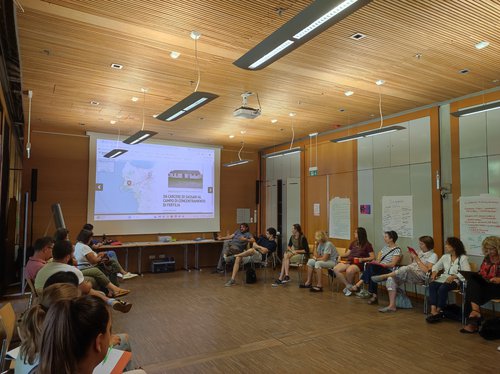
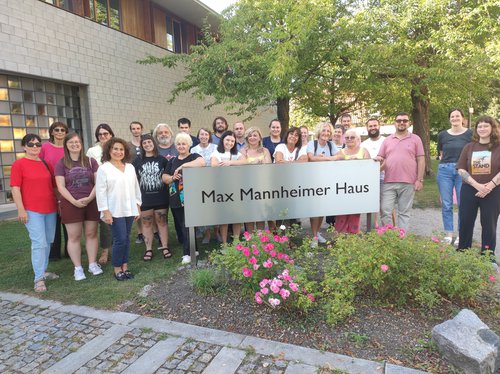
On 16 September 2024, students of the First Grammar School Maribor (orig. Prva gimnazija Maribor) visited the medieval synagogue in Maribor, which today houses the Center of Jewish Cultural Heritage Synagogue Maribor. On their visit the young people of Maribor were presented with many aspects of Jewish life throughout the history of Maribor and the land of Styria (Slov. Štajerska, Germ. Steiermark). They learned about the great importance of the Jewish community for medieval Maribor and were especially interested in the outstanding individuals, who lived in the city more than five centuries ago. Their interest was even higher as the lecture approached the Second World War. The tragic fates of Maribor Jews in the holocaust rendered the students and their professors speechless.
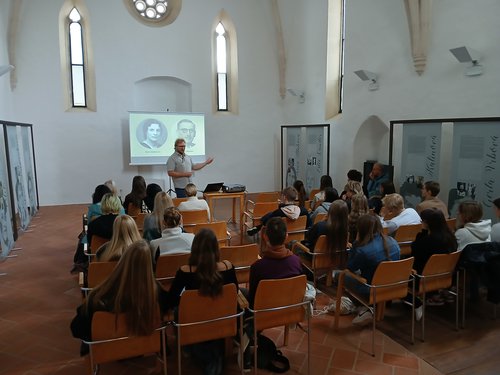
On January 27 and 28, 2025, Documenta organized a study visit for policy and decision makers at the Memorial and Museum Auschwitz-Birkenau. The visit included the commemoration in occasion of the 80th anniversary of the liberation of the camp, taking place on January 27th - Holocaust remembrance day. On January 28, the participants visited the Museum in Auschwitz-Birkenau and met with representatives of the Jewish Center in Oświęcim. The visit aimed to gather policy and decision makers from different European countries, to raise their awareness about the importance of remembrance, and the important role they can play in confronting Holocaust denial and distortion today. More information about the visit is available at: Study Visit to Memorial and Museum Auschwitz-Birkenau – Documenta
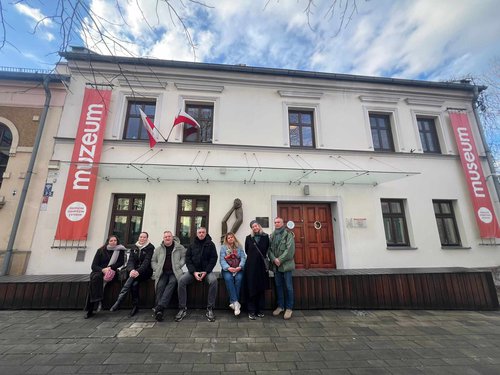
From the 7th to the 10th of July 2025, around 25 young people from different European countries participated to the Study Visit and Action Day in Stara Gradiška, Croatia. The activity aimed at raising awareness about the neglected remains of the Stara Gradiška concentration camp and prison, and at directly acquainting young people with this complex site of memory. The participants visited the Jasenovac memorial site, the Stara Gradiška camp, and discussed questions and perspectives connected to cultural heritage and its conservation. They also had the chance to meet with the descendants of those who suffered in the Ustaša camp at Stara Gradiška, and for engaging in dialogue about responses to historical revisionism in different countries. The activity also marked the 83rd anniversary of the Action of Diana Budisavljević.
More information at: Sjećanje na Dianu Budisavljević – Documenta
Here you can access the report written by Helena Redmer, one of the participants of the study visit: Report
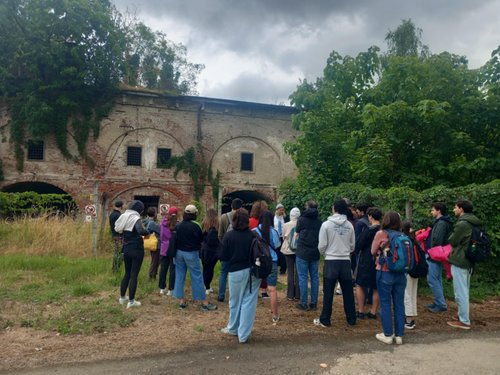
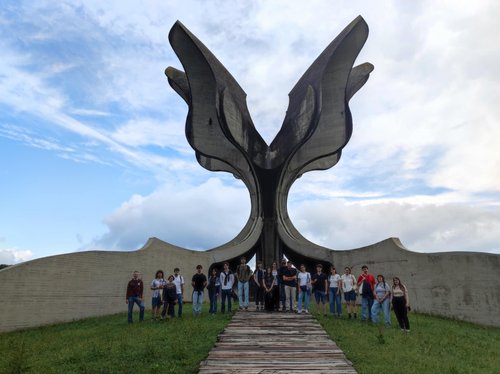
Topografia per la storia, in cooperation with the partners, organized the study visit “Remembering Internment: Le Fraschette Camp and the Politics of Memory” in Rome and Alatri, Italy, from the 17th to the 20th of September 2025.
On the first day of the programme, representatives from Topografia per la storia presented the historical context, and the history of the Fraschette camp, one of Italy’s largest camp during Fascist era, and then camp for displaced people after WWII. The participants learned more about the history of Fascist internment in occupied Yugoslav territories and the complex legacy of Le Fraschette. In the afternoon, they took part in a workshop on the question of which approaches to memory are appropriate or allowed, which promoted interesting discussions about challenges connected to remembrance practices. The participants also took part to a workshop on visual education and critical use of AI tools, coordinated by the photographers and educators Sandra Vitaljić and Saša Kralj. On the second day of the programme, the participants visited the memorial site in Le Fraschette, which is today mostly in ruins and not memorialized. Through the methodology of “slow walk”, the participants were motivated to take a sensitive approach on inspecting the remains of the camp and on taking photographs. After that, the group met with local representatives, including the mayor of Alatri and representatives of the organization “Il Campo”, dealing with the remembrance of the Fraschette camp.
The visit aimed at reconstructing and interpreting the history of fascist internment in occupied Yugoslav territories as well as to critically examine memory culture, including the aesthetics of photographing ruined sites of violence and to support efforts for the preservation of Le Fraschette by giving international visibility to it.
Here you can access the report by Helena Redmer, one of the participants to the study visit: Report_Le Fraschette
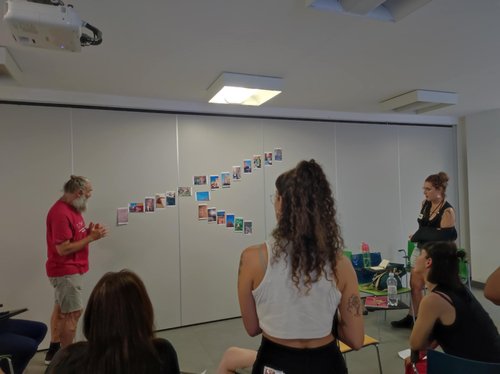
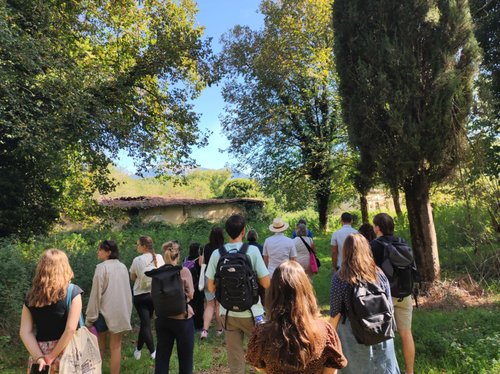
From the 26th to the 29th of September 2025, IIT, in cooperation with the project’s partners, held a Seminar for educators in Timisoara, Romania. On the first day of the program, after an introduction to the project, its main objectives and activities, the coordinator presented the project results, with a focus on the toolkit and the researched biographies, which could be used by the participating teachers and educators in their everyday work with youth. The day also included sessions on Holocaust distortion and denial, and the use of personal stories to counter it, in the experience of the organization TOLI (The Olga Lengyel Institute for Holocaust Studies and Human Rights) and its representatives. In the afternoon, the participants became more familiar with chosen biographies from the partner countries, and were involved in workshops on how to use them as a tool to discuss Holocaust education, as well as to counter Holocaust denial and distortion in the classroom. On the second day, the partner organization EUROM and Synagogue Maribor presented their work and methods. Teachers from Spain presented their good practices and workshops, while the director of the Maribor Synagogue presented his research and the chosen biographies and personal stories selected for the project. In the afternoon, the participants discussed possible challenges and risks that might arise when using personal stories to discuss Holocaust with youth. Then, divided into groups, developed new learning activities based on the shared biographies.
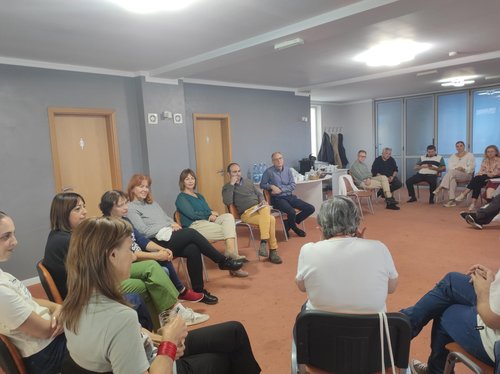
On October 23, 2025, EUROM, in cooperation with the consortium, organized the Conference “Twisting the past: questioning historical revisionism”. The conference, held at the University of Barcelona, aimed to bring together experts from different fields to discuss current challenges of Holocaust denial and trends of manipulation of the past. The conference also wanted to offer a space for critical reflection on democratic memory and discuss strategies of resistance to revisionism through academic research, critical education, and fact-based public dissemination. The conference included 3 main panels: the first panel focused on the relation between Francoism and the Holocaust, and analysed how the Second Republic and Francoism normalized and used anti-Semitic discourses. The second panel focused on the role of social media in the transmission of historical knowledge, and involved the influencers Josefa Mesa and Mikel Herran, both dealing with sharing historical memory, and challenging far right denialism on their social media channels. The third panel of the conference consisted in the presentation of the book “Francofacts: disassemblying the fake news about the Franco regime”. In the book, the authors aimed to debunk myths and misinformation on the Franco regime through fact-based approaches.
More information and the complete program is available at: Twisting the Past: Questioning Historical Revisionism - The European Observatory on Memories of the University of Barcelona’s Solidarity Foundation
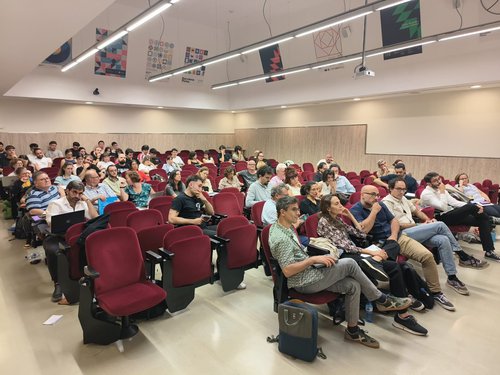
__________________________________________________________________________________________________________________
PROJECT RESULTS
R1. Desk Research on denial and distortion of the Holocaust and other WWII genocides in the partner countries (Croatia, Germany, Italy, Romania, Slovenia, Spain) - Desk Research
R2. Recommendations - PPSCO - Recommendations - Kultura sjećanja
R3. Toolkit - PPSCO - Toolkit - Kultura sjećanja
R4. Digital Biographies - PPSCO - Digital Biographies - Kultura sjećanja
R5. Digital Exhibition - PPSCO - Online Exhibition - Kultura sjećanja
__________________________________________________________________________________________________________________
REPORT ON PROJECT ACTIVITIES
WP1: EDS_WP1
WP2: EDS_WP2
WP3: EDS_WP3
WP4: EDS_WP4
WP5: EDS_WP5
